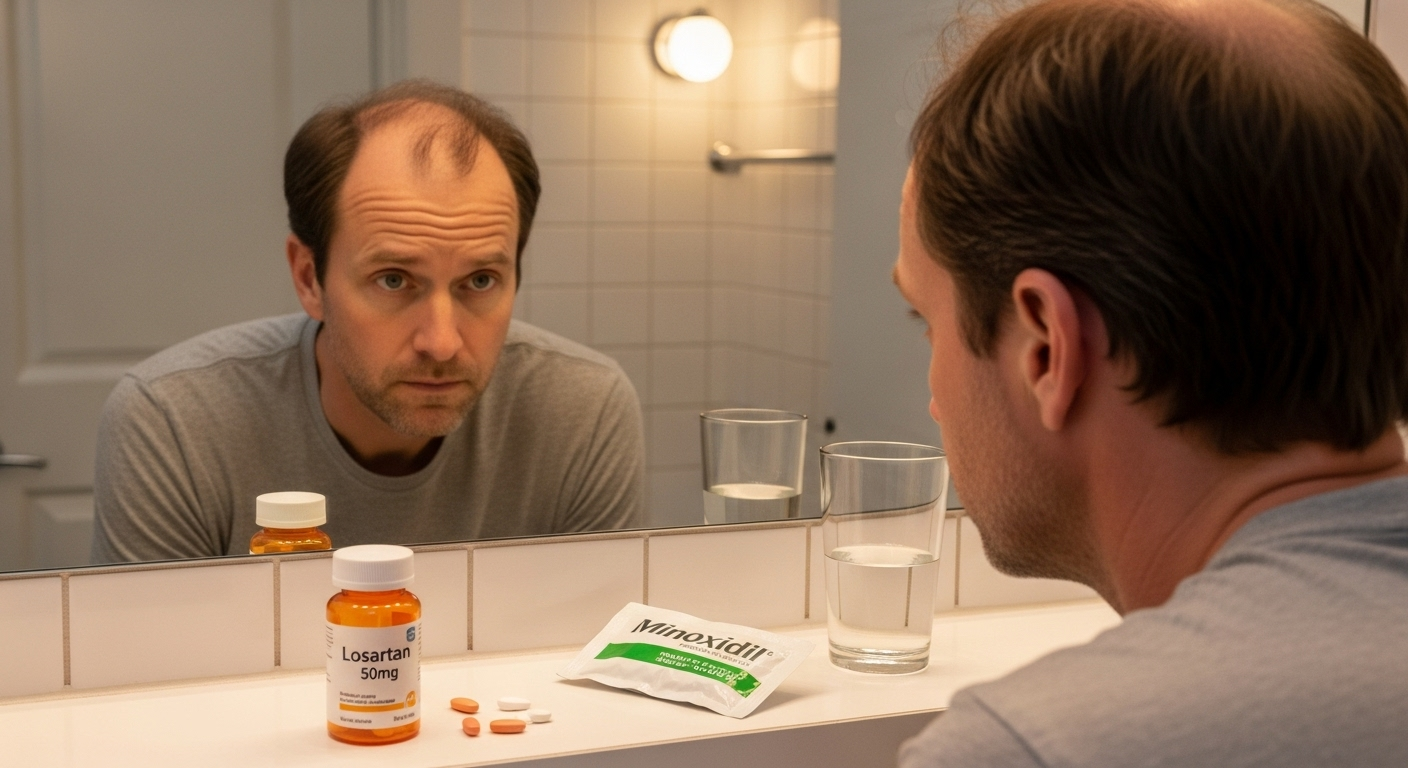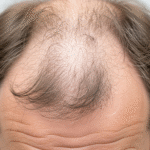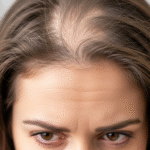Hair loss can be a concerning side effect of several medications, and losartan, a widely used medication for managing high blood pressure and diabetes, is no exception. Although hair loss isn't a common or well-known side effect of losartan, some people do experience increased shedding, especially after prolonged use. If you're wondering, "Is hair loss …
Hair loss can be a concerning side effect of several medications, and losartan, a widely used medication for managing high blood pressure and diabetes, is no exception. Although hair loss isn’t a common or well-known side effect of losartan, some people do experience increased shedding, especially after prolonged use. If you’re wondering, “Is hair loss from losartan permanent?” you’re not alone.
Many people face this issue, and fortunately, it can often be reversed with the right approach. In this article, we will explore why losartan might cause hair loss, whether it is permanent, and what you can do to prevent or reverse it.

Understanding Losartan and Its Side Effects
What Is Losartan?
Losartan is an angiotensin II receptor blocker (ARB) commonly prescribed to treat high blood pressure, diabetic nephropathy, and heart failure. It works by blocking the action of angiotensin II, a hormone that constricts blood vessels and increases blood pressure.
By relaxing the blood vessels, losartan helps reduce the workload on the heart and lowers blood pressure. In addition to treating high blood pressure, losartan is also used to protect the kidneys in people with diabetes.
While losartan is generally well-tolerated by most patients, like any medication, it can come with side effects. Some of these include dizziness, fatigue, headaches, and upper respiratory infections.
Hair loss, though rare, has also been reported by some individuals taking the drug. However, it’s important to note that hair loss may not be caused directly by losartan but could be the result of other factors, such as the rapid weight loss associated with the medication, changes in nutritional intake, or other underlying health conditions.
Common Side Effects of Losartan
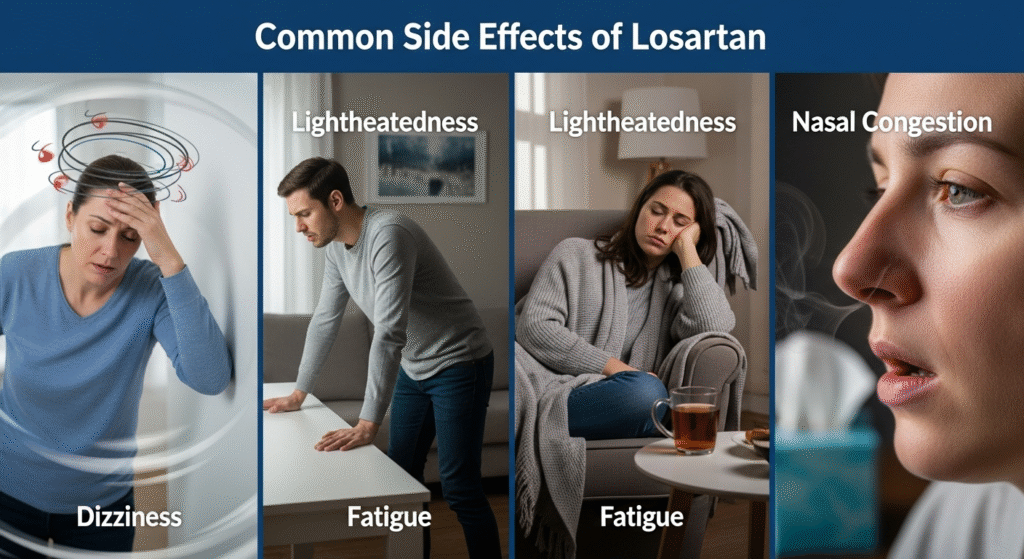
Some of the common side effects of losartan include:
- Dizziness or lightheadedness
- Fatigue or tiredness
- Headaches
- Upper respiratory infections
- Elevated potassium levels (hyperkalemia)
In rare cases, patients may experience more serious side effects, such as kidney problems or an allergic reaction. Hair loss is not typically listed as a common side effect, but some individuals may be more prone to it due to personal sensitivity or other factors.
Is Hair Loss from Losartan Permanent?
The Link Between Losartan and Hair Loss
The link between losartan and hair loss is not entirely clear, but telogen effluvium — a type of temporary hair loss — is the most common form associated with this medication. Telogen effluvium occurs when hair follicles prematurely enter the resting phase (telogen) of the hair growth cycle, causing the hair to shed.
This can be triggered by several factors, including stress, nutritional deficiencies, or rapid weight loss, all of which can be associated with the effects of taking losartan.
It’s important to understand that hair loss caused by losartan is usually not permanent. Most patients who experience hair shedding while taking this medication report that their hair regrows after stopping the drug or after adjusting their diet or supplementation to address potential deficiencies.
What Causes Hair Loss on Losartan?

Several factors could contribute to hair loss while on losartan, and understanding these factors can help address the issue:
- Rapid Weight Loss: If you are on losartan as part of a weight loss regimen or have experienced significant weight loss as a result of improved blood pressure and heart function, this can cause telogen effluvium. The body may go into a state of shock due to the sudden changes, leading to increased hair shedding.
- Nutritional Deficiencies: People on losartan may experience changes in appetite or eating habits. When combined with a restricted or imbalanced diet, you may not be getting the essential vitamins and minerals needed for hair health, such as iron, biotin, vitamin D, and zinc. Nutrient deficiencies can lead to hair thinning and loss.
- Underlying Health Conditions: If you have high blood pressure, diabetes, or heart disease, these conditions themselves may contribute to hair thinning. Additionally, some medications used in conjunction with losartan, like beta-blockers or ACE inhibitors, are more commonly linked with hair loss.
- Stress: Chronic stress is a known trigger for telogen effluvium. If you’re under stress due to your health or treatment plan, this could exacerbate the hair loss you’re experiencing while on losartan.
How to Manage and Prevent Hair Loss While on Losartan
While hair loss on losartan can be concerning, the good news is that it’s often temporary and manageable. Here are expert-backed strategies for managing and preventing hair loss while taking this medication:
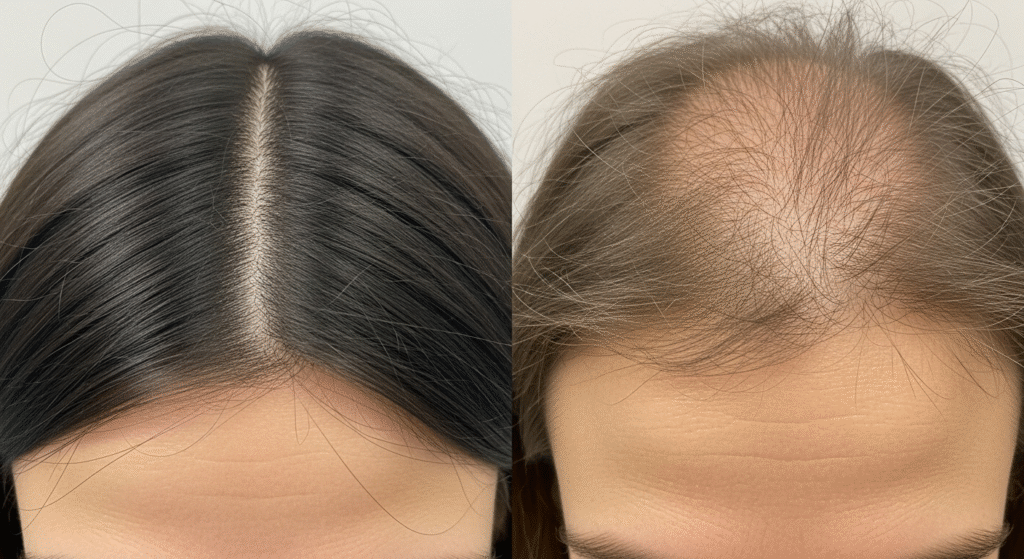
1. Consult Your Healthcare Provider
Before making any changes, it’s essential to discuss your hair loss with your healthcare provider. They can evaluate whether losartan is the cause of your shedding or if another factor is involved. They may recommend alternative medications or offer treatments that minimize hair loss. Never stop or change your medication without professional guidance.
2. Prioritize a Nutrient-Rich Diet
One of the most important steps you can take to stop hair loss is to ensure your body is getting the nutrients it needs to support healthy hair growth. Consider the following:
- Protein: Hair is made of keratin, a type of protein, so adequate protein intake is essential for hair growth. Include lean meats, fish, eggs, and legumes in your diet.
- Iron: Iron deficiency is one of the leading causes of hair shedding. Foods like spinach, lentils, and red meat are excellent sources of iron.
- Zinc: Zinc is vital for hair tissue growth and repair. You can find zinc in foods like nuts, seeds, and whole grains.
- Vitamins A, C, D, and E: These vitamins play a crucial role in maintaining hair follicle health. Include fruits, vegetables, and fortified foods in your diet to ensure you’re getting enough.
A balanced diet helps provide the essential nutrients for hair follicles and can also help combat stress.
3. Consider Supplements
If you’re having difficulty getting enough of the right nutrients from food alone, consider supplements. Biotin (vitamin B7), vitamin D, iron, and zinc supplements can help support hair growth. However, it’s important to consult with a healthcare provider before starting any supplements to ensure you’re using them correctly and not interfering with other medications.
4. Practice Stress Management
Since stress can trigger or exacerbate hair loss, learning to manage it is essential. Consider incorporating the following strategies into your daily routine:
- Meditation: Regular mindfulness meditation can help reduce stress and promote overall well-being.
- Exercise: Physical activity boosts blood circulation, helping nourish your scalp and encourage hair growth.
- Adequate Sleep: Ensure you’re getting 7-8 hours of sleep each night, as poor sleep can contribute to stress and negatively affect hair health.
5. Switch to Gentle Hair Care Products
Using gentle, non-stripping hair care products can help prevent further damage to your hair. Here are a few tips:
- Use sulfate-free shampoos and conditioners that are designed to be gentle on the hair.
- Avoid excessive heat styling and harsh chemicals that can weaken hair strands.
- Massage your scalp gently while washing your hair to increase blood circulation and promote healthy hair growth.
6. Explore Hair Regrowth Treatments
In cases where hair loss is significant, treatments like minoxidil or platelet-rich plasma (PRP) therapy may be beneficial. Minoxidil is an over-the-counter topical treatment that can stimulate hair regrowth, while PRP therapy uses your own blood’s platelets to encourage hair growth at the follicle level.
7. Adopt Hair-Safe Styling Habits
Avoid tight hairstyles like ponytails, buns, or braids, which can pull on the hair and contribute to breakage or traction alopecia. Try loose styles and reduce the use of hair ties that put pressure on your hair.
When to Seek Professional Help
If your hair loss continues for more than 6 months or worsens, it’s important to consult a dermatologist or trichologist. They can assess the cause of your hair loss and offer personalized treatments. A specialist can check for underlying conditions, such as hormonal imbalances or nutritional deficiencies, and help you address them effectively.
FAQs
1. Is hair loss from losartan permanent?
Hair loss from losartan is typically temporary. Most individuals experience hair regrowth once the underlying cause is addressed, whether through changes in diet, supplements, or medication adjustments.
2. What can I do to stop hair loss from losartan?
Focus on nutrition, stress management, and gentle hair care practices. Supplements like biotin, iron, and vitamin D can also support hair health.
3. How long does hair loss last after stopping losartan?
If losartan is the cause of your hair loss, shedding usually stops within 3-6 months of discontinuation, and hair regrowth typically begins within 6-12 months.
4. Can I continue taking losartan if I experience hair loss?
You should consult with your healthcare provider before making any changes to your medication. They may adjust your dosage or suggest alternatives.
5. Should I use minoxidil to treat hair loss from losartan?
Minoxidil is an FDA-approved treatment for hair loss and can be effective. Consult a healthcare provider to ensure it’s appropriate for you.
Conclusion
Hair loss caused by losartan, while rare, is generally temporary and reversible. By maintaining a nutrient-rich diet, managing stress, and using gentle hair care practices, you can prevent and manage hair loss. Consult with your healthcare provider to address any concerns and explore personalized treatment options.
If you’re experiencing hair loss while on losartan, schedule a consultation with Dr. Uzma Irfan, an ISHRS-certified surgeon in Islamabad to discuss possible solutions. We’ll work with you to create a personalized treatment plan for optimal hair health.

